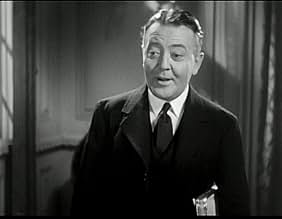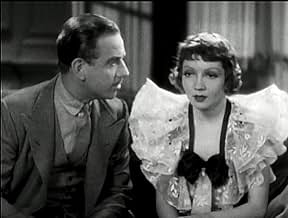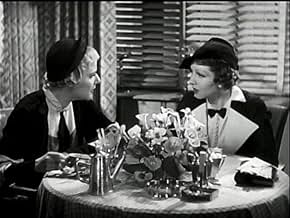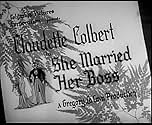PUNTUACIÓN EN IMDb
6,5/10
775
TU PUNTUACIÓN
Añade un argumento en tu idiomaAn efficient secretary at a department store marries her boss, but discovers that taking care of him at home is a lot different to taking care of him at work.An efficient secretary at a department store marries her boss, but discovers that taking care of him at home is a lot different to taking care of him at work.An efficient secretary at a department store marries her boss, but discovers that taking care of him at home is a lot different to taking care of him at work.
- Dirección
- Guión
- Reparto principal
- Premios
- 1 premio en total
Grace Hayle
- Agnes Mayo
- (as Grace Hale)
Ernie Adams
- Passerby
- (sin acreditar)
William Arnold
- Department Head
- (sin acreditar)
Lynton Brent
- Assistant Window Dresser
- (sin acreditar)
Edmund Burns
- Newspaper Photographer
- (sin acreditar)
A.S. 'Pop' Byron
- Store Watchman
- (sin acreditar)
Reseñas destacadas
Claudette Colbert and Melvyn Douglas star in "She Married Her Boss," a 1935 comedy also starring Edith Fellows and Jean Dixon.
This is a very dated comedy including a wife having to leave her career when she gets married, drunk driving, and child abuse - all things that are pretty much out now. Sometimes it's hard, but the only way to get anything out of these movies is to take them for what they were - done at a specific time when society mores were different. Some of it, however, has to do with the censors, particularly the career woman part, and there really wasn't any need for it. Interesting to me that the censors were very careful to push the nonworking mom but okayed spanking a kid with a hairbrush and drunk driving.
Claudette Colbert is Julia Scott, an efficient assistant at a department store, taking care of a huge office for her boss Richard Barclay (Melvyn Douglas). Julia isn't happy - her idea of a real career would be to marry her boss, with whom she's been in love for six years. She gets her wish, and his darling daughter (Fellows) along with it.
Julia finds that Barclay's home is a mess, and sets about putting it in order. Bonding with his daughter is going to take more, however, than mere efficiency. The kid's a brat. And Barclay's sister, who's used to having things her own way, is no party either.
Colbert is fabulous, and Douglas, one of the great actors, doesn't infuse a terrible part with much warmth. His character isn't very likable, and one never feels that this is a truly married and in love couple. I don't really blame Douglas - the role is badly written, to go along with some of the script. The supporting actors are all excellent, including the aforementioned, Katherine Alexander as Barclay's sister and Raymond Walburn as the butler.
There are some very good scenes, and the film is definitely worth it for Colbert - and a look at how far we've come in some arenas.
This is a very dated comedy including a wife having to leave her career when she gets married, drunk driving, and child abuse - all things that are pretty much out now. Sometimes it's hard, but the only way to get anything out of these movies is to take them for what they were - done at a specific time when society mores were different. Some of it, however, has to do with the censors, particularly the career woman part, and there really wasn't any need for it. Interesting to me that the censors were very careful to push the nonworking mom but okayed spanking a kid with a hairbrush and drunk driving.
Claudette Colbert is Julia Scott, an efficient assistant at a department store, taking care of a huge office for her boss Richard Barclay (Melvyn Douglas). Julia isn't happy - her idea of a real career would be to marry her boss, with whom she's been in love for six years. She gets her wish, and his darling daughter (Fellows) along with it.
Julia finds that Barclay's home is a mess, and sets about putting it in order. Bonding with his daughter is going to take more, however, than mere efficiency. The kid's a brat. And Barclay's sister, who's used to having things her own way, is no party either.
Colbert is fabulous, and Douglas, one of the great actors, doesn't infuse a terrible part with much warmth. His character isn't very likable, and one never feels that this is a truly married and in love couple. I don't really blame Douglas - the role is badly written, to go along with some of the script. The supporting actors are all excellent, including the aforementioned, Katherine Alexander as Barclay's sister and Raymond Walburn as the butler.
There are some very good scenes, and the film is definitely worth it for Colbert - and a look at how far we've come in some arenas.
I used to deal in old-movie memorabilia. In the 1960s, while running a stall in the Portobello Road, I acquired and resold a full-colour poster for 'She Married Her Boss'. What a bizarre piece of artwork! The poster depicted Claudette Colbert with blue eyes, blue hair, and blue skin: she looked a proper Smurfette, or perhaps an Oompa-Loompa. Worse luck, the blue Colbert was placed against a background in the same shade of blue, making her seem to vanish altogether ... except for her lips, which were bright red. For decades, I wanted to view this movie to find out if it was as weird as the poster art.
It turns out to be even weirder. Who designed the costumes here? In the opening scene, Colbert wears a dress with some nice gauntlet cuffs, but it also has a titchy little bow-tie and a pair of lapels the size and shape of an aircraft carrier. In a later scene, Jean Dixon wears an outfit with what appears to be a springboard jutting out of her left shoulder. In the final sequence, Colbert sports raccoon shoulder pads that are so enormous she looks like a linebacker.
This is a screwball comedy, but it's screwier than it needs to be. Michael Bartlett plays a lounge lizard who charms Colbert by telling her she ought to have a mole on her chin. (Ugh!) You know those horribly phony camera set-ups in which an actor sits at a piano keyboard, pumping his elbows, and we're expected to believe he's playing? Bartlett does that here, in one of the fakest versions I've ever seen.
On the positive side, there's a stand-out performance by 12-year-old Edith Fellows as a spoilt brat. Fellows was an immensely talented child actress who had the misfortune to be much less pretty than Shirley Temple, so she got lumbered with Virginia Weidler roles. Colbert hauls Fellows offscreen and gives her a spanking, which would have been funnier if shown on screen. I was delighted by the performance of Raymond Walburn as Melvyn Douglas's butler: amiable, loyal and eventually drunken. Walburn usually played blustering shysters or roguish criminals, so it's a pleasure to see him given this change of pace. Grace Hayle, a character actress whose heavy physique usually cast her in buffoonish roles, is personable here in a nice bit role as Colbert's assistant.
Although the plot is unbelievable (even by screwball comedy standards), individual set pieces are delightful and funny. Colbert and Bartlett host a cocktail party in the shop window of Douglas's department store, with shop dummies as the guests.
The climax of the movie is meant to be funny and romantic, but I found it saddening and maddening. Douglas pretends to abduct Colbert at gunpoint: we know he's faking, but she doesn't and she's evidently terrified. Douglas and Walburn, both drunk to the eyebrows, take Colbert speeding through the city in Douglas's motorcar, the stonkered Walburn at the wheel whilst an undercranked camera shows the car speeding wildly through the streets. I can laugh at comedy based on drunkenness, but it stops being funny when the drunks grab a steering wheel: there have been so many drink-driving tragedies, I just can't laugh at the notion of an inebriate operating a car.
Talking of booze: this movie was directed by Gregory La Cava, a hugely talented and under-rated director who ruined his career through alcoholism. Maybe I'm reading too much into this, but quite a few of La Cava's films -- including this one -- depict characters who solve their problems by getting drunk. I'll rate 'She Married Her Boss' 7 out of 10, but I wish someone could explain this movie's weird Smurfette poster and those ridiculous costumes.
It turns out to be even weirder. Who designed the costumes here? In the opening scene, Colbert wears a dress with some nice gauntlet cuffs, but it also has a titchy little bow-tie and a pair of lapels the size and shape of an aircraft carrier. In a later scene, Jean Dixon wears an outfit with what appears to be a springboard jutting out of her left shoulder. In the final sequence, Colbert sports raccoon shoulder pads that are so enormous she looks like a linebacker.
This is a screwball comedy, but it's screwier than it needs to be. Michael Bartlett plays a lounge lizard who charms Colbert by telling her she ought to have a mole on her chin. (Ugh!) You know those horribly phony camera set-ups in which an actor sits at a piano keyboard, pumping his elbows, and we're expected to believe he's playing? Bartlett does that here, in one of the fakest versions I've ever seen.
On the positive side, there's a stand-out performance by 12-year-old Edith Fellows as a spoilt brat. Fellows was an immensely talented child actress who had the misfortune to be much less pretty than Shirley Temple, so she got lumbered with Virginia Weidler roles. Colbert hauls Fellows offscreen and gives her a spanking, which would have been funnier if shown on screen. I was delighted by the performance of Raymond Walburn as Melvyn Douglas's butler: amiable, loyal and eventually drunken. Walburn usually played blustering shysters or roguish criminals, so it's a pleasure to see him given this change of pace. Grace Hayle, a character actress whose heavy physique usually cast her in buffoonish roles, is personable here in a nice bit role as Colbert's assistant.
Although the plot is unbelievable (even by screwball comedy standards), individual set pieces are delightful and funny. Colbert and Bartlett host a cocktail party in the shop window of Douglas's department store, with shop dummies as the guests.
The climax of the movie is meant to be funny and romantic, but I found it saddening and maddening. Douglas pretends to abduct Colbert at gunpoint: we know he's faking, but she doesn't and she's evidently terrified. Douglas and Walburn, both drunk to the eyebrows, take Colbert speeding through the city in Douglas's motorcar, the stonkered Walburn at the wheel whilst an undercranked camera shows the car speeding wildly through the streets. I can laugh at comedy based on drunkenness, but it stops being funny when the drunks grab a steering wheel: there have been so many drink-driving tragedies, I just can't laugh at the notion of an inebriate operating a car.
Talking of booze: this movie was directed by Gregory La Cava, a hugely talented and under-rated director who ruined his career through alcoholism. Maybe I'm reading too much into this, but quite a few of La Cava's films -- including this one -- depict characters who solve their problems by getting drunk. I'll rate 'She Married Her Boss' 7 out of 10, but I wish someone could explain this movie's weird Smurfette poster and those ridiculous costumes.
Executive secretary marries her (presumably divorced) boss, a department store magnate, and tries making a home for them both and his bratty nine-year-old daughter; the trouble is, he thought he married a savvy, sharp businesswoman, not a "flouncy, coy" housewife. Interesting depiction of a woman's role in the workplace--circa 1935--vis-à-vis her role as a wife and stepmother. Some of the high society patter is fast and fresh, but when the moviemakers get maudlin, the picture goes down the drain. Claudette Colbert gives a good performance, though Melvyn Douglas gets stuck with the worst of it (walking in on family frivolity with a scowl, misunderstanding a compromising photo of his wife in the newspaper, getting drunk along with the butler, etc.). Sassy Edith Fellows gives it a goose until she, too, is reduced to hysterics. ** from ****
Most modern viewers of 1930's comedies will be accustomed to the necessity of suspending disbelief and modern sensibilities to entirely enjoy these films. However, She Married Her Boss contains one or two scenes which make this a difficult task. The main problematic scene is the drunk driving scene which is sufficiently reckless as to be just plain alarming to modern audiences but fortunately occurs at the end of the movie so as not to be troubling throughout. The second such scene however is the (aural) scene of Julia (Claudette Colbert) spanking Anabelle several times with a hairbrush. In modern times, with the idea of physically punishing children being so controversial, this scene refuses to simply fade into the background of the film and become simply a comedic scene and lingers in a slight feeling of unease in watching the remainder of the film despite Annabelle's growing affection for Julia. Simliarly Julia's friends taunts of Annabelle appear somewhat cruel; being adults ganging up on an unhappy child, no matter how obnoxious her behaviour.
Although some of the comedic aspects of the film may not translate to a modern audience, the film nevertheless contains some gems of serious scenes - Claudette Colbert's reaction to her husband mocking her for behaving like a woman and his criticism that she is making their marriage "just like any other marriage". Similarly the shop dummy scene can be enjoyed on a number of levels, the drunken comedy is delightful but also wonderful is Colbert's pained expression and declaration that "Julia doesn't live here anymore". Finally my favourite scene of the film, when Melvyn Douglass confronts Colbert after her antics in the shop window appear in the press, effectively calling her "second hand goods". Colberts reactions from resignation, to pride to hurt to confrontation are a pure acting lesson.
While some of the comedy may struggle to appeal to modern audiences, the scene of the new bride (Colbert) being carried over the thresh-hold by her new husband's butler remains one of the funniest moments in 1930's comedy and Julia's kicking of the child shop dummy (surely a reaction to her troubled step-daughter) remains a guilty pleasure so that despite some reservations the film continues to work on both the dramatic and comedic levels despite some need to be prepared more than usual to put modern considerations aside to entirely enjoy this.
Although some of the comedic aspects of the film may not translate to a modern audience, the film nevertheless contains some gems of serious scenes - Claudette Colbert's reaction to her husband mocking her for behaving like a woman and his criticism that she is making their marriage "just like any other marriage". Similarly the shop dummy scene can be enjoyed on a number of levels, the drunken comedy is delightful but also wonderful is Colbert's pained expression and declaration that "Julia doesn't live here anymore". Finally my favourite scene of the film, when Melvyn Douglass confronts Colbert after her antics in the shop window appear in the press, effectively calling her "second hand goods". Colberts reactions from resignation, to pride to hurt to confrontation are a pure acting lesson.
While some of the comedy may struggle to appeal to modern audiences, the scene of the new bride (Colbert) being carried over the thresh-hold by her new husband's butler remains one of the funniest moments in 1930's comedy and Julia's kicking of the child shop dummy (surely a reaction to her troubled step-daughter) remains a guilty pleasure so that despite some reservations the film continues to work on both the dramatic and comedic levels despite some need to be prepared more than usual to put modern considerations aside to entirely enjoy this.
"She Married Her Boss" is a forgotten but alluring Columbia classic, directed by Gregory La Cava, a modest auteur with a flair for upbeat improvisation and delicate touch. La Cava's unassuming touch is less fully evident in this small heartwarming romantic comedy than the director's superior pictures like "Stage Door", "My Man Godfrey", and "Primrose Path".
But "She Married Her Boss" features highly resourceful Claudette Colbert as the competent department store secretary Julia that falls for her boss Richard Barclay (Melvyn Douglas); it also has an unintentionally funny, almost surreal moment involving a department store window and mannequins. As it turns out the film is all Colbert's -- and another reminder what a lovely, divine comedienne Ms. Colbert was. The supporting cast, all wonderful, includes
"She Married Her Boss" is the sort of cuddly classic that works best if you watch it with someone you love or care about.
But "She Married Her Boss" features highly resourceful Claudette Colbert as the competent department store secretary Julia that falls for her boss Richard Barclay (Melvyn Douglas); it also has an unintentionally funny, almost surreal moment involving a department store window and mannequins. As it turns out the film is all Colbert's -- and another reminder what a lovely, divine comedienne Ms. Colbert was. The supporting cast, all wonderful, includes
"She Married Her Boss" is the sort of cuddly classic that works best if you watch it with someone you love or care about.
¿Sabías que...?
- CuriosidadesThe beginning theme music is the same as the 1934 movie It Happened One Night.
- Citas
Julia Scott: This is Grandma Scott. She knitted the Dred Scott decision on a piece of old burlap.
Selecciones populares
Inicia sesión para calificar y añadir a tu lista para recibir recomendaciones personalizadas
Detalles
- Duración
- 1h 25min(85 min)
- Color
- Relación de aspecto
- 1.37 : 1
Contribuir a esta página
Sugerir un cambio o añadir el contenido que falta



































